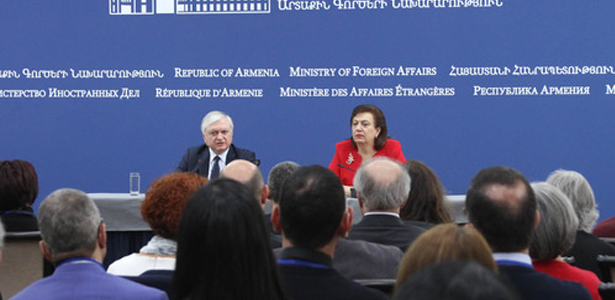Participants of 8th Pan-Armenian Forum of Journalists meet with Armenia’s Foreign Minister

On October 20, Armenia’s Minister of Foreign Affairs Edward Nalbandyan received the participants of the 8th Pan-Armenian Forum of Journalists from 27 countries around the world. RA Minister of Diaspora Hranush Hakobyan was attending the meeting.
According to the press service of the RA Ministry of Foreign Affairs, Minister Nalbandyan welcomed the Diaspora Armenian journalists to the Ministry of Foreign Affairs and attached importance to these kinds of meetings in the sense that they help directly inform Diaspora Armenians about Armenia’s foreign policy.
Edward Nalbandyan presented the priorities in Armenia’s diplomacy, particularly Armenia’s guiding role in condemning the Armenian Genocide and in preventing new crimes against humanity, touched upon the process of settlement of the Nagorno-Karabakh conflict, the developments unfolding in the Near East, the Syrian crisis in detail and, in that context, the assistance that is being provided to Syrian-Armenians.
Touching upon the settlement of the Nagorno-Karabakh conflict, Armenia’s Minister of Foreign Affairs stated the following: “I have said it before, but after hearing Baku’s latest statements, I am forced to repeat that Azerbaijan has lost sense of the reality. It has lost it to the extent that it is trying to present its myths for internal use to not only its own public, but also the international community.
Baku claims that it is ready for mutual concessions. What are those concessions according to Azerbaijan? Is it the ensuring of security of Nagorno-Karabakh as they propose and the peaceful coexistence between the two nations? This is already similar to a threat, not concession. They say that if we don’t what they say, there will be no peace. Is it the granting of autonomy? After the demise of the Soviet Union, Azerbaijan has not had any control over Nagorno-Karabakh, much less today. Now it is offering autonomy under its control and presenting that as a concession? This means that it is offering something that Artsakh has more today as a concession.
In its latest statements, Azerbaijan’s leadership claims that the recommendations of the Co-Chairs are in line with its views, but just days before these statements, the President of Azerbaijan confessed that the international community is forcing him to recognize the independence of Nagorno-Karabakh, and he is opposing it. If the positions are so much in line with each other, then it is necessary to recognize Artsakh’s independence, not oppose it.
It is clear that Azerbaijan is mixed up with its views and needs help to get out of that situation. To resolve the conflict, Azerbaijan needs to acknowledge the mediating assistance of the international community that the Co-Chairs of the OSCE Minsk Group (Russia, the United States and France) are offering.
The leaders of the co-chairing countries have expressed their views on the Nagorno-Karabakh conflict in the five well-known statements. If they are in line with Azerbaijan’s position, then why is Baku avoiding by all means to accept the principles and elements enshrined as an integrity therein as a basis for negotiations and averting from making any reference to them, just like it happened during the Eastern Partnership Summit in Riga from which the Azerbaijani delegation simply escaped?
Six months after Azerbaijan’s aggression in April, Baku suddenly invented a new myth of who unleashed the military operations, crudely violated international humanitarian law and committed barbarous acts in an attempt to blame the Armenian side for all that Azerbaijan has been continuously boasting about in the presses, on social networks and granting high awards to the offenders.
One gets the impression that Azerbaijan has declared a contest to see which high-ranking officials can tell the most lies and confuse the public, but we all know which side always comes out victories in such contests in Azerbaijan.
However, the myths of the Azerbaijani leadership are not only extending to the Nagorno-Karabakh conflict.
According to Baku, all democratic norms are respected in Azerbaijan. For instance, civil society is thriving. However, it turns out that the UN Special Reporter has a different opinion. In late September, the special reporter declared that the civil society of Azerbaijan is paralytic and is in the worst situation since independence. Of course, one can make many other references to the statements of international organizations regarding the embarrassing situation in Azerbaijan.
According to Baku, the Azerbaijani press is completely free. However, according to the Committee on the Defense of Journalists, Azerbaijan is among the countries with the most censure. Moreover, it is in the fifth “honorary” place. According to the World Press Freedom indicator, Azerbaijan is in 163rd place among 179 countries.
Azerbaijan’s leaders love to repeat that they are building a multi-cultural and multi-religious society hinged on tolerance. How does that correspond to the 2016 Report of the European Commission against Racism and Intolerance of the Council of Europe, which expresses concern about the anti-Armenian propaganda at the state level and the discrimination against national and religious minorities of Azerbaijan?
The most favorite “balloon” of Azerbaijan’s leadership, that is, the economy, also “popped” last year when the economic underwent serious convulsions due to the fall of oil and gas prices. As for the national currency (manat), according to Bloomberg, it registered the greatest decline in the world. This means that Azerbaijan was sitting on the “needle” of gas and oil, the “needle” struck the “balloon”, and the air slowly came out. This was all the success that they praised.
After all this, I think it is needless to ask who can believe in this falsehood.”




 Արևելահայերեն
Արևելահայերեն Արևմտահայերեն
Արևմտահայերեն Русский
Русский






